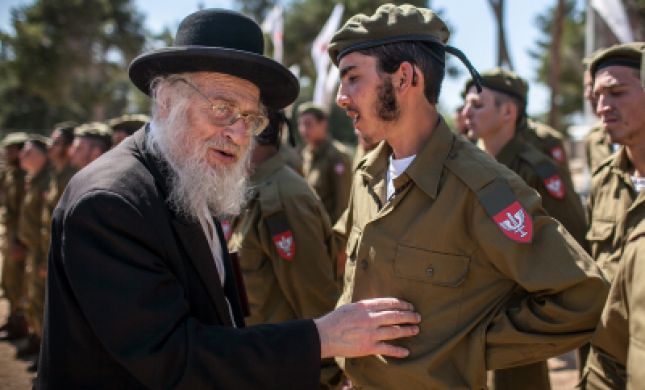Do Not Put an End to Ultra-Orthodox Army Service
Following the dissolution of the Committee to Advance Equality in Sharing the Burden, committee head MK Yohanan Plesner submitted proposals for alternatives to the Tal Law. In this article, IDI Researcher Attorney Haim Zicherman, who served as the content coordinator of the Plesner Committee, warns that some of those measures were personal recommendations rather than recommendations of the Committee, and may reverse trends of increasing army service by ultra-Orthodox Jews.

The Committee to Advance Equality in Sharing the Burden (the "Plesner Committee"), which was tasked with promoting integration and advancing equality in sharing the burden of service, exploded with a bang, and the public's disappointment is understandable. The Israeli middle class, worn down by the burden of its civil responsibilities, is concerned by minority groups that abstain from shouldering the burden equally with other citizens of the State of Israel.
The issue of ultra-Orthodox army service, which is driving the current debate between Israel's secular and ultra-Orthodox populations, is complicated on several distinct levels. The first focuses on the ethical question: What is the value of Torah study for the Jewish people, the nation, and the State of Israel? Should a diligent Torah scholar be exempt from army service much in the manner as an outstanding athlete is exempt? Does the study of Torah physically protect the country's citizens?
The next level of disagreement is rooted in the moral question of distinguishing between blood and blood. Ben-Gurion outlined this issue clearly in his letter to Chief Rabbi Herzog: "This is first and foremost a great moral question. Is it appropriate for the son of Mrs. X to be killed while fighting for the homeland, while the son of Mrs. Y sits in his room and studies in safety, when the majority of Israeli youth are risking their lives?" This is the origin of the social demand to narrow the gap in the distribution of the burden of defense. And finally, the issue reaches a third, practical tier: How can we integrate Israel's ultra-Orthodox population into Israel's public domain, economy, and work force?
There are no easy answers to these three levels of questions-ethical, moral, and practical. And yet, despite the fact that these questions are so fundamental, they have been pushed aside in the public arena in favor of the subject that is currently concerning everyone: the intensity of the sanctions that will be imposed on the Haredim, or-if we drop the euphemisms-the question of how Israeli society will punish the ultra-Orthodox community for being different.
At the same time, the Israeli public is unaware of the changes the ultra-Orthodox community has undergone in recent years. Social processes of "Israelification" are at their height within ultra-Orthodox society: Thousands of ultra-Orthodox citizens are pursuing academic degrees and thousand of graduates are building careers in a wide range of professional fields. Indeed, the employment rate of ultra-Orthodox men skyrocketed by 6% in three years. Since 2007, when the special service tracks for ultra-Orthodox men were established (the Shachar program in the Israel Defense Forces as well as National Civil Service programs), the number of men who enlisted multiplied eightfold (increasing from 305 recruits in 2007 to 2,372 in 2011). In fact, last year the IDF suspended its recruitment of ultra-Orthodox soldiers because its budget could not keep up with the demand.
The change in the ultra-Orthodox lifestyle that we are witnessing is a necessary response to the realities of life. The ultra-Orthodox community understands the need for socio-economic balance. For the first time in three decades, an ultra-Orthdox tribe of Zebulun is rapidly emerging [according to tradition, the tribe of Zebulun supported the tribe of Issachar in order for the latter to be able to dedicate itself to Torah study]-a group that is maintaining its ultra-Orthodox traits while integrating into the world of work.
For the first time, ultra-Orthodox leaders are publically declaring their support for ultra-Orthodox enlistment. They are encouraging Haredi men who are not engaged in Torah study to join the workforce. This is a significant change, one that is reaching the heart of ultra-Orthodox consensus and leadership.
Why, then, are we so committed to complicating the already complex equation by introducing a system of sanctions? Why would we undermine the enormous change that is happening before our very eyes? Does anyone really think that we can raise the rate of ultra-Orthodox involvement beyond the rate that we have achieved to date? Are the IDF and the labor market ready for such growth?
MK Yohanan Plesner's recommendations to set quotas for exemptions of Torah scholars and to impose individual and criminal sanctions were not discussed by the committee that he headed. Those recommendations are his personal recommendations. There is no dispute about the desired goal: increasing equality in sharing the burden and promoting the integration of the ultra-Orthodox community into the Israeli public sphere. There is a great deal of disagreement, however, about the desired methods. I believe, as do all the experts on ultra-Orthodox society who appeared before the Plesner Committee, that introducing elements of coercion will undo the achievements gained until now.
Do not put an end to ultra-Orthodox army service.
IDI Researcher Attorney Haim Zicherman was the content coordinator for the Committee to Advance Equality in Sharing the Burden (the Plesner Committee).
IDI would like to thank our summer intern Lily Wilf for her work on the translation of this article.
- Tags:
- Conditional partnership,
- Haredi Conscription,
- Judaism and Democracy,
- Minorities,
- Religion and State,
- Right to Equality,
- Ultra-Orthodox,
- Citizenship,
- Equal Sharing of the Burden,
- IDF service,
- ultra-Orthodox/Haredi,
- Israeli society,
- The Labor Market,
- equality,
- religion and state,
- Religion and State Program
